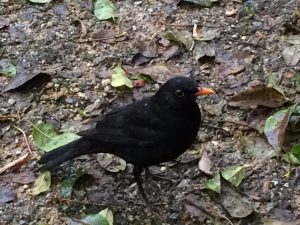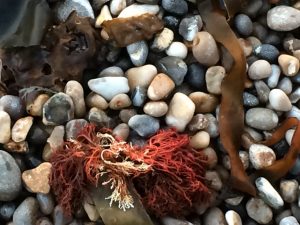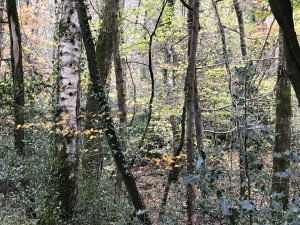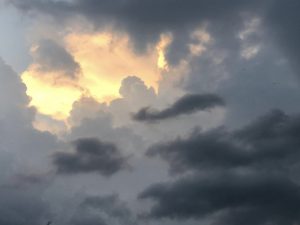I feel rather nervous writing a blog post at the start of 2021. 2020 unrolled in ways unforeseen and ended with further unexpected and daunting twists and turns. There has been much heartache for many and unexpected difficulties, as well as some positives. Thinking about 2021, and some of the ‘New Year’ themes people often write about seems challenging to say the very least. Education, does, however, have a part to play in responding to these challenges, particularly education which foregrounds creativity and opening spaces for possibilities of new ways to be in the world together.
In Sustainable and Democratic education: opening spaces for complexity, subjectivity and the future (2020) I argue that education has the potential to enlarge ‘the space of the possible’ (Davis et al. 2004:4) rather than replicate the existing possible. Such education can encourage emergence of the new, including new subjectivities (ways to be in the world and to relate with others, including the other than human). It can open possibilities for unforeseen and unforeseeable futures. ‘Enlargement of the possible’ is needed now more than ever before, in this era of the Anthropocene, where Western hubris threatens both human survival and that of myriad others on our shared planet.
Education, particularly Western education founded on ideas such as rationality, autonomy and static conceptions of the world, needs to be re-envisioned if it is to have potential to enlarge the space of the possible, including other possible ways to be in and know the world. Such re-envisioned education needs to encourage playful engagement with the abundant materials and possibilities of the thick present. It needs to make time and space for encountering others, for listening, for attentiveness, entanglement, entwining, tenderness towards the other and a willingness to enter into encounters in what Topolski (2015:176) calls ‘the space between I and we’. Such encounters require ‘carefully listening to available voices’ and ‘actively de-centring the taken-for-granted human voice and the re-centring of more-than-human voices’ (Jickling 2018: 35).



I recognise that encouraging emergence of the new can be problematic, raising for example questions such as what if what emerges is not seen as desirable and who gets to decide. Education can be a place to explore these questions. Ideas and inspirations can be drawn from a range of sources (see Chave 2020) including Indigenous thinking on relationality (for example see Little Bear 2000, 2016, McGregor 2009, Donald et al. 2012), feminist ethics of care (for example see Gilligan 1982,Tronto and Fisher, 1991, Puig de la Bella Casa 2017) and Arendt’s (1974 [1958]) thinking on immanent ethics. Arendt proposes forgiveness and mutual promise-making as a way to respond to the unboundedness, unpredictability and irreversibility which arises when the new is inserted into the world and taken up by others in unforeseen ways.
These are hopeful ideas. This is not hope arising from what Dryzek (2005) calls a ‘Promethean’ view in which we rely on human ingenuity to find ways for us to return to and continue with ‘business as usual’. Instead it is hope founded on approaches which challenge the myth of separateness whilst also not erasing the uniqueness of each participant in the world. It is hope which values all humans and parts/participants of the wider natural world, as well as the inter and intra connections between us. Having hope is not always easy. I am grateful to the poet Evelyn Araluen Corr, a descendant of the Bundjalung Nation, who shared with me that in her Indigenous language the concept of hope includes a sense of ‘acting as though hope were possible’. This opens a way to act for and towards hope even in situations which appear hopeless: a situation many understandably feel in the world today. It emphasises the necessarily active nature of hope – a focus on ‘doing’ rather than ‘contemplation’ – calling to mind Orr’s (2007:1) assertion that ‘Hope is a verb with its sleeves rolled up’.
Wishing you an active and hopeful 2021!

Sarah Chave, January 2021
ssc203@exeter.ac.uk
References
Arendt, H. (1974 [1958]) The human condition. Chicago: University of Chicago Press.
Chave, S. (2020) Sustainable and democratic education: Opening spaces for complexity, subjectivity and the future. London: Routledge. [available from http://bit.ly/2VRhXnP 20% discount with code BSE2, also available on kindle]
Davis, B., Phelps, R. and Wells, K. (2004) Complicity: An introduction and a welcome. Complicity: An International Journal of Complexity and Education, 1(1):1-7.
Donald, D., Glanfield, F. and Sterenberg G. (2012) Living ethically within conflicts of colonial authority and relationality. Journal of the Canadian Association for Curriculum Studies, 10(1). Dryzek, J. (2005) The politics of the earth: Environmental discourses (2nd Edition). Oxford: Oxford University Press.
Gilligan, C. (1982) In a Different Voice: Psychological Theory and Women’s Development. Cambridge, MA: Harvard University Press.
Jickling, B. (2018). On Wilderness. In Jickling, R., Blenkinsop, S., Timmerman, N. and De Danann Sitka-Sage, M. (eds.) Wild Pedagogies: Touchstones for re-negotiating education and the environment in the Anthropocene (Palgrave studies in educational futures). New York: Palgrave MacMillan, pp.23-50.
Little Bear, L. (2000) Jagged world views colliding. In Batisse, M. Reclaiming Indigenous voice and vision. Vancouver: University of British Columbia Press. Also available from: http://www.learnalberta.ca/content/aswt/worldviews/documents/jagged_worldviews colliding.pdf [Accessed 14.10.2019].
Little Bear, L. (2016) Blackfoot metaphysics ‘waiting in the wings’. Congress of the Humanities and Social Sciences Big Thinking Lecture 1.6.2016. Available from: https://www.youtube.com/watch?v=o_txPA8CiA4 [Accessed 18.11.2018].
McGregor, D. (2009) Honouring our relations: An Anishnaabe perspective on environmental justice. In Agyeman, J., Cole, P., and Haluza-Delay, R. (eds.) Speaking for ourselves: Environmental justice in Canada, Vancouver, BC: University of British Columbia Press, pp. 27-41.
Orr, D. (2007) Optimism and hope in a hotter time. Conservation Biology, 21(6):1392-1395. doi.org/10.1111/j.1523-1739.2007.00836.x
Puig de la Bellacasa, M. (2017) Matters of care: Speculative ethics in more than human worlds, 3rd Edition. Minneapolis: University of Minnesota Press.
Topolski, A. (2015) Arendt, Levinas and a politics of relationality, (Reframing the boundaries: Thinking the political). London: Rowman & Littlefield International.
Tronto, J. C. & Fisher, B. (1991) Toward a feminist theory of caring. In Abel, E. & Nelson M. (eds.) Circles of care. Albany, NY: SUNY Press, pp. 36-54.


Sarah, thank you for your thoughtful and hopeful piece as we start 2021.
In shedding notions of certainty and critically questioning ‘business as usual’ models, we also seek to think and do education differently to bring learners into relationship with the world through affective, embodied and sensory encounters. It’s a ‘chaotic place of unknowing’ (Somerville, 2008) as we embrace the ‘moments of arrival, moments of realisation, moments of discovery’ that occur when one is getting lost (Solnit, 2006:x).
There is, of course, no option but to ‘stay with the trouble’ (Haraway, 2016). And for all to flourish, we need all kinds of storytelling; those of hope to balance those of trouble (Haraway and Tsing, 2019). And those with an openness to enchantment where one feels ‘a sense of delight and disruption – at once being drawn to and astonished by the world’ (Merewether, 2019:235).
Courageous learning and teaching are key to the bold experimentation and generation of imaginative possibilities that is required to transform ways of knowing in times of ecological uncertainty. We propose relational ‘pedagogies of attention’ that seek to build connection with more-than-human kin. Relationships ‘turn up the colour’ and help us ‘tune in to the world’ … so we can move forward ‘with a positive energy and an attention to the exploration of alternate possibilities’ (Geoghegan and Woodyer, 2014: 219).
We look forward to witnessing more-than-human stories as they reveal themselves in 2021, and to sharing these tales with you and others this year.
• Geoghegan, H. & Woodyer, T. (2014) Cultural geography and enchantment; the affirmative constitution of geographical research. Journal of Cultural Geography, 31 (2), 218-229
• Haraway, D. (2016) Staying with the trouble: Making Kin in the Chthulucene (Experimental Futures). Durham, North Carolina: Duke University Press
• Haraway, D. and Tsing, A. (2019) Reflections on the Plantionocene- a conversation with Donna Haraway and Anna Tsing moderated by Gregg Mitman https://edgeeffects.net/wp-content/uploads/2019/06/PlantationoceneReflections_Haraway_Tsing.pdf [date accessed 05/05/2020]
• Merewether, J. (2019) Listening with young children: enchanted animism of trees, rocks, clouds (and other things). Pedagogy, Culture and Society, 27(2), 233-250
• Somerville, M. J. (2008) Waiting in the chaotic place of unknowing’: articulating postmodern emergence. International Journal of Qualitative Studies in Education, 21 (3), 209-220
Thank you for such a deep and thoughtful reply. I will ponder on these ideas and references and I too look forward to sharing ideas and adventures with you both in the year ahead, either virtually , or maybe even face to face ! Let’s hope.
Youre so cool! I dont suppose Ive read something like this before. So nice to search out any person with some unique thoughts on this subject. realy thank you for starting this up. this website is something that is needed on the internet, someone with a bit originality. helpful job for bringing one thing new to the internet!